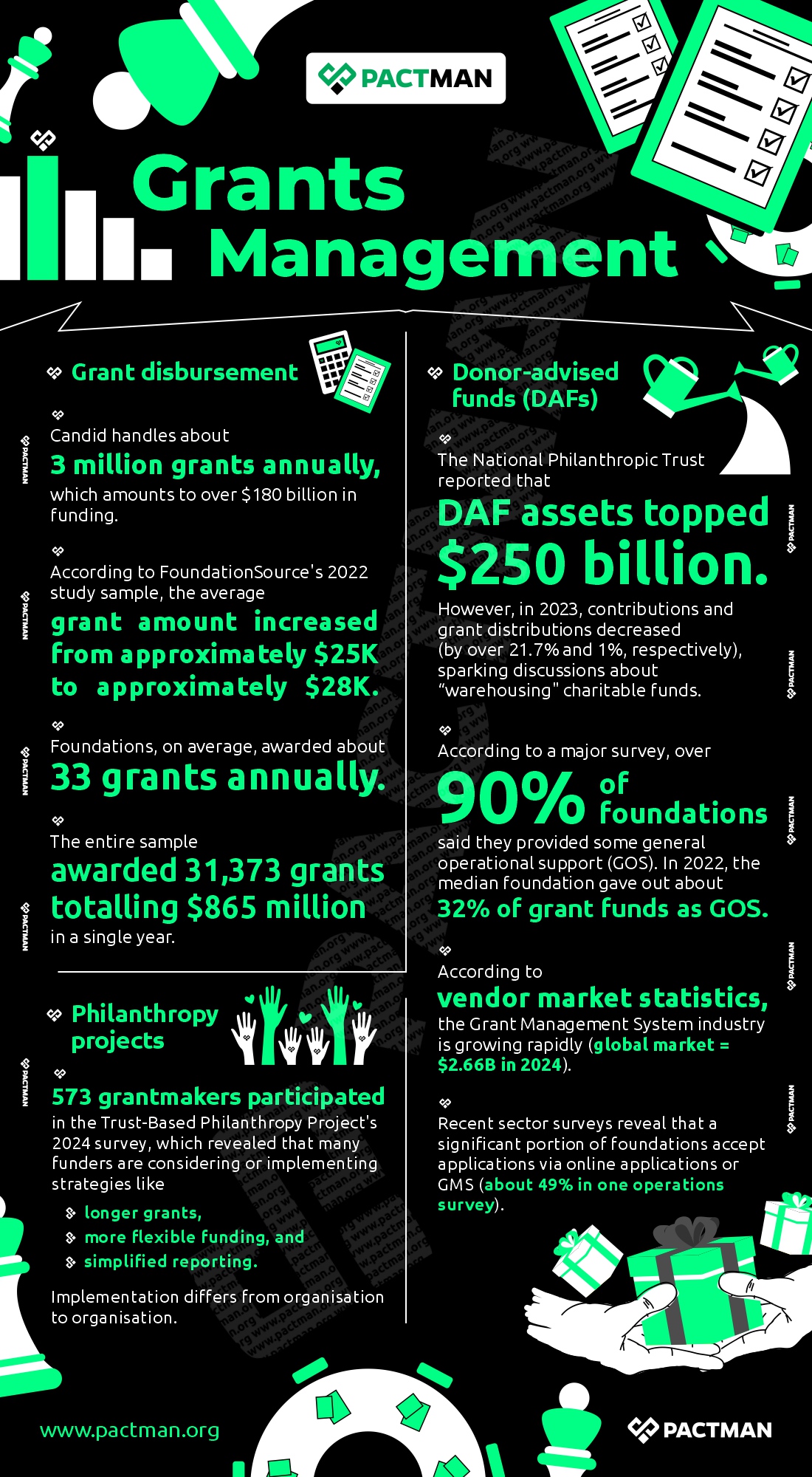I
Introduction
If you’re fortunate enough that the grant selection process went your way, it means the application is complete, and the grant management procedure has officially begun. Since we know the grant will be awarded, who is responsible for overseeing it? By and large, the response to that question differs from one organisation to the next. However, no one person is solely in charge of managing and administering the funding.

Oftentimes, organisations wait until they get the notice of award before they think about grant management. Also, for others, the project director or the grant writer may be de facto responsible if this event is not planned. In smaller organisations, the grant writer is the project director, who was named in the grant application and possibly on SF-424 for the pertinent contact details. This person fully expects to be in charge of managing the grant.
Organisations requesting funding for the first time may overlook these factors because they lack a written plan for the administrative obligations involved with grant financing. On the other hand, large organisations that administer and receive a lot of grants have specialised departments that handle the organisation’s daily communications. This includes requests and reports for a variety of supported activities. The majority of universities, for instance, have offices dedicated to grant administration and accounting. The former focuses on bringing funds into the school, and the latter on overseeing grants when they are obtained.
This article aims to give you an overview of the crucial steps to take in implementing an effective grant management system.
II
The Imperative of Grant Management
One of the first lessons in grant management is that no work or expenses should be done on the project before its formal start date. The project start date is the day that both parties agree for the project to formally begin, or a later date. Until the proposal’s formal start date, none should begin any activities or record expenses that will be repaid.

To begin with, it is advised that an organisation first have a fundamental grasp of the requirements and procedures related to grant administration. Likewise, after the grant is awarded, there is a need to create a plan for implementing those actions.
An organisation must be aware of the strengths and weaknesses of its team before starting the program development and application preparation process. It must also comprehend how individual strengths may be used to produce better programs and applications and, consequently, better outcomes. A grants team is better than an individual since it lessens the workload when there are tight deadlines. More importantly, different people tend to contribute varied viewpoints to the process. The manner in which each participant processes information and engages with the outside world is where they diverge most.
Individual preferences within the organisational setting must be learned and analysed to progress as efficiently as possible. Also, the negotiation before the grant letter will be your first opportunity to adopt good grant management techniques. You may want to renegotiate the start date of the program to align with a tangible organisational schedule.
III
Critical Statistics on Grant Management
In this section, we will consider critical trends in grant management across various sectors.
Number of grants processed annually:
a. Grant disbursement
Candid handles about 3 million grants annually, which amounts to over $180 billion in funding. This makes it one of the biggest and most frequently updated datasets for grantmaking activities. Also, according to FoundationSource’s 2022 study sample, the average grant amount increased from approximately $25K to approximately $28K. In addition, foundations, on average, awarded about 33 grants annually. The entire sample awarded 31,373 grants totalling $865 million in a single year.

b. Donor-advised funds (DAFs)
The National Philanthropic Trust reported that DAF assets topped $250 billion. However, in 2023, contributions and grant distributions decreased (by over 21.7% and 1%, respectively), sparking discussions about “warehousing” charitable funds.
According to a major survey, over 90% of foundations said they provided some general operational support (GOS). In 2022, the median foundation gave out about 32% of grant funds as GOS. According to vendor market statistics, the Grant Management System industry is growing rapidly (global market = $2.66B in 2024). Recent sector surveys reveal that a significant portion of foundations accept applications via online applications or GMS (about 49% in one operations survey).
c. Philanthropy projects
573 grantmakers participated in the Trust-Based Philanthropy Project’s 2024 survey, which revealed that many funders are considering or implementing strategies like
- longer grants,
- more flexible funding, and
- simplified reporting, while implementation differs from organisation to organisation.
IV
Nonprofit Guide to Conducting Grant Management at Scale
Despite their apparent difficulty, grant management tasks are made easier by a well-thought-out and executed organisational system. This includes knowledge of the requirements that come with the grant. Here are the crucial aspects to consider in your grant management process.

1. Adopt Performance Management Systems
Grantees must put in place mechanisms to track grant activities and advancement to uphold accountability criteria. In order to properly manage the project, there must be performance management systems that guarantee a timely collection of the required data.
For instance, people who spend time on grant-related activities are required to provide documentation proving that they spent a specific number of hours or a significant portion of their time on grant-related activities. Hence, the difficulty of remembering the amount of time spent is decreased when timesheets and accompanying documents are regularly collected. This allows for frequent reporting of grant-related activity.
Additionally, by reporting this information regularly, responsible managers might adjust staff duties to guarantee grant deadline compliance. Procurement and purchase systems are also crucial components of performance management systems. These systems create a paper trail for every expense from a purchase order to an encumbrance to the acquisition and payment of necessary products and services.
To further improve system accountability, accounting systems must be configured to prevent grant funds from being mixed with the organisation’s finances. A high-quality performance management system with well-integrated components makes information easily accessible, consistent, and user-friendly.
2. Leverage Systematic Reporting
By and large, grant reporting is the aspect of grant management that most closely aims to guarantee accountability to the intended purpose specified in the grant award. Depending on the program, the performance management system’s value is shown quarterly, semiannually, or annually. This is especially crucial when the funding agency demands that the proof be included in formal progress reports.
Also, reporting demonstrates to program staff and agency managers that the organisation is competent and that implementation is progressive.
Basically, there are two kinds of reports, and across the majority of firms, different people handle the two tasks independently. They are:
- Technical reports and
- financial reports
Essentially, these are the two categories of reports that need to be turned in. These forms record fund flows and project financial status. They also address the financial aspect of the reporting load. The technical report is a narrative account written by the project director, who is in charge of overseeing the project’s implementation on the ground. This regular progress report outlines completed tasks and their timeliness in accordance with the plan written in the application program narrative. The report describes the components that are and are not on time, as well as how their status impacts the execution of the program as a whole.
It is recommended that the project director create these periodic reports either alongside or after the financial reports are completed. The funding agency will review the reports jointly.
3. Prioritise Record Retention
Thirdly, a strong grant management system will produce a large amount of paperwork. This may include data, reports, and other documents that show the work done to undertake the grant project. Hence, record retention requirements should be consulted before discarding these documents.
Because of the space and maintenance needs that come with having a lot of print documents, many major organisations set up procedures to control how critical records are disposed of once their useful cycles are over.
Organisations are restricted by federal grant requirements to keep specific papers, especially financial documents, associated with a grant project.
To begin with, always maintain records for as long as necessary to comply with internal or external policies. To guard against future lawsuits or complaints, every organisation should keep a timetable that specifies when each collection of records is to be purged. The records should then be disposed of as soon as possible after that date.
4. Emphasise Amendments
Unexpected changes are a frequent occurrence. The fact is that things happen, and your best-laid plans will be changed. This may be either against your will or as a result of your own creativity in figuring out a better course of action. Sometimes things go better than expected, and other times they go worse. Even more, agencies are willing to accept modifications to your program’s methodology. Hence, the so-called scope of work adjustments are made possible by scope of work amendments.
At the basic level, organisations can occasionally make adjustments to their strategy right away. However, in theory, they should wait for the agency to formally approve a request to modify the project’s scope of work as outlined in the program narrative.
Modifications to the budget are also sometimes required due to changes in the scope of work, inaccurate cost projections, or price adjustments. A budget adjustment entails asking for a transfer from one functional category to another (for example, travel to salary) and explaining the transfer’s necessity. It’s possible that a qualified applicant for a grant-funded post couldn’t be employed at the planned rate or that the employee would be required for a higher proportion of time than originally anticipated.
These changes are frequent, and approval is typically based on a technicality. However, the goal of the request and approval procedure is to guarantee that the change won’t affect the program’s goals or its anticipated results, unless it improves them above the status quo without the amendment.
5. Prepare Grant Closing /Final Report
Lastly, a final report of expenses and activities must be prepared and submitted at the conclusion of the grant. This could be either on the day it is planned to conclude or on the expiration of any agreed extensions. Essentially, this report highlights the program’s achievements and shortcomings while covering all activities. It is a kind of assessment of the work completed and how it fits the requirements outlined in the application’s program narrative.
Now more than ever, the results of grant projects are being scrutinised more closely. As a result, reports must be submitted on time and in full to keep the organisation from being classified as delinquent. This implies that before you can get fresh funding, you will need to pay back the delinquent reports.
Conclusion
In summary, if you understand the guidelines and requirements you must meet and have a solid grant management system, you can process grant management paperwork and requests easily and with confidence. Note, good performance combined with timely and thorough reports creates a foundation of trust. Funding agencies tend to appreciate and respect when an organisation chooses to submit another grant application.
Likewise, incomplete, late, or delinquent reports are a surefire way to guarantee that your organisation’s external funding stream will dry up. Failure to meet the requirements of the funding agency will result in grant terminations, potential legal action, and a damaged reputation with funding agencies. Success will follow if you handle grants with the same consideration and care that you give to the application process.


